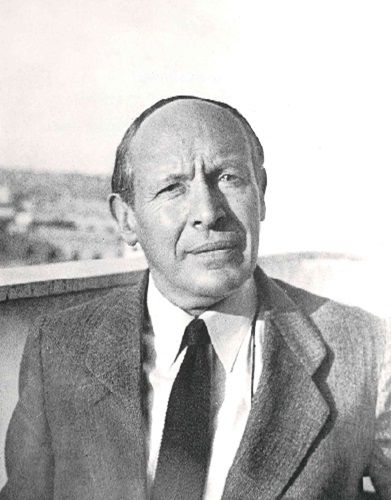Marcello Finzi book collection
Bibliographic material from the family of Marcello Finzi, professor of Criminal Law and Procedure at the University of Modena (Ferrara 1879 – Rome 1956)
1. Origin and location of the fund
Included since 2002 among the museum sites inventored by C.R.U.I., the Fund came into possession of the Faculty of Law in 1958, acquired from the heirs of the illustrious Ferrara jurist Marcello Finzi, who was first professor of Law and Criminal Procedure at the University of Ferrara (1912-1925) and then held the same chair at the University of Modena, where he was full professor since 1927. With the enactment of the racial laws in 1938, Finzi had to flee to Argentina, where he taught at the University of Córdoba until the end of the war, before being reinstated in the role of full professor of criminal law in Modena until his retirement in 1951. He died in Rome five years later. From the documentation available in the historical archives of the University, it emerges that the purchase of the fund was the result of a conversation started the year before between the former rector, Rodolfo Ambrosino, supported by the director of the university library, Stelio Crise, and Marcello Finzi's widow, Adele Olschki, eager to allocate the book collection in question to a cultural, not-for-profit institution. According to what the rector declared in the meeting of the Board of Directors on 21 February 1958 where the proposal was accepted, the resolution to purchase proceeded from the consideration that “the purchase of the aforementioned library would enrich the bibliographic heritage of the University as regards the chair of criminal law, which does not yet have many books at disposal.” It should be noted that the allowance approved - two million lire at the time - is equivalent, in terms of monetary conversion/revaluation, to an amount of just over thirty thousand euros today. Intended for the former Institute of Internal Public Law (except for a brief period of assignment to the Institute of Criminal Law, which closed in 1963), the collection would then become part of the library of the Department of Legal Science, established in 1997. At the subsequent merging of the library collection into that of the University Library System, the Finzi fund passed on to the management of the related departments, notwithstanding its unvaried location in the premises of the current Department of Law, Language, Interpretation and Translation (IUSLIT).
2. Consistency and characteristics
The book collection amounts to approximately 2,150 volumes, mainly on criminal law, and it includes texts ranging from the 16th century to the 1940s. The bibliographical value of the collection is due not only to the rarity of many of the volumes preserved therein, but also to the presence of important autographs, evidence of the network of academic and political relationships cultivated by the scholar. A further peculiarity is represented by the presence of Latin-American publications of the time - almost unavailable elsewhere in our country - the result of the strong ties that Finzi had established in Argentina, where he had taught for a long time. It is, therefore, a corpus of books including rare volumes (since the Middle ages, the Renaissance), but also much more recent specimens, not less rare both because of their singular geographical origin and due to the uniqueness of the author’s autograph.
3. Enhancement of the collection
The entire collection was catalogued and all books are now indexed in the online catalogue, the only exception being the only present manuscript, which will be valorized separately. The whole fund can be retrieved cumulatively, as individual titles are linked to the name of their owner (“possessore”).
4. Remarkable/noteworthy items
As regards the items, the most remarkable is definitely the aforementioned anonymous manuscript - probably dating back to the second half of the 18th century - which comprises the chronicles of all capital punishments executed in Bologna from 1030 to 1791. Very interesting are also some legal classics from the time of Inquisition, attributable, among others, to authors such as Carpzov, Farinaccio, Scaccia, Scanaroli. Noteworthy is the collection of rare law texts on criminal matters and criminal proceedings, with particular reference to the varied galaxy of pre-unification Italian codes: among these, remarkable for its splendid typographical design, is an edition of the Draft Criminal Code for the Kingdom of Italy (1806), in the very copy that probably belonged to the Minister of Justice Giuseppe Luosi (1735-1830), not forgetting the official Bodoni edition of the Criminal Code for the States of Parma, Piacenza and Guastalla, promulgated in 1820 by Marie Louise of Austria. As regards public law at the turn of the 19th century, extraordinary for its completeness is the publication concerning the controversy opposing the advocates of the Classical Criminal School and those of the Positive School. The names of Carrara, Lucchini, Garofalo, Ferri, Lombroso appear, along those of numerous students and followers, in a range of editions including as well uncommon Latin-American translations. Further evidence of Finzi's scientific liaisons are the important works from the 1920s and 1930s, made unique by the authors' signed inscriptions: for example, the first edition of L’abuso di foglio in bianco (1903), by Arturo Rocco, father of the current Italian Criminal code (1930) and Finzi's predecessor in the chair of Criminal Law and Procedure at the University of Ferrara.
Essential reading
F. Peroni, Il fondo librario Marcello Finzi presso la Facoltà di Giurisprudenza di Trieste, in Marcello Finzi giurista a Modena (Attidel convegno di studi di Modena, 27 gennaio 2005), acura di E. Tavilla, Olschki, 2006, p. 71-77














